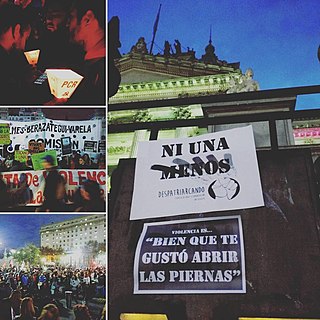
Women on Waves (WoW) is a Dutch nongovernmental organization (NGO) created in 1999 by Dutch physician Rebecca Gomperts, in order to bring reproductive health services, particularly non-surgical abortion services and education, to women in countries with restrictive abortion laws. Other services offered by WoW include contraception, individual reproductive counseling, workshops, and education about unwanted pregnancy. Workshops are conducted for lawyers, doctors, artists, writers, public health care activists, as well as for women and men to learn about contraceptive practices and non-surgical, self-induced abortion using RU-486. Services are provided on a commissioned ship that contains a specially constructed mobile clinic, the A-Portable. When WoW visits a country, women make appointments, and are taken on board the ship. The ship then sails out approximately 20 km, to international waters, where Dutch laws are in effect on board ships registered in the Netherlands. Once in international waters, the ship's medical personnel provide a range of reproductive health services that includes medical abortion.
Abortion in Brazil is a crime, with penalties of 1 to 3 years of imprisonment for the pregnant woman, and 1 to 4 years of imprisonment for the doctor or any other person who performs the abortion on someone else. In three specific situations in Brazil, induced abortion is not punishable by law: in cases of risk to woman's life; when the pregnancy is the result of rape; and if the fetus is anencephalic. In these cases, the Brazilian government provides the abortion procedure free of charge through the Sistema Único de Saúde. This does not mean that the law regards abortion in these cases as a right, but only that women who receive abortions under these circumstances, and the doctors, will not be punished. The punishment for a woman who performs an abortion on herself or consents to an abortion performed by another outside these legal exceptions is one to three years of detention. The base penalty for a third party that performs an illegal abortion with the consent of the patient, ranges from one to four years of detention, with the possibility of increase by a third if the woman comes to any physical harm, and can be doubled if she dies. Criminal penalties fixed at four years or less can be converted to non-incarceration punishments, such as community service and compulsory donation to charity.
In one scholarly conception, the history of feminism in Poland can be divided into seven periods, beginning with 19th-century first-wave feminism. The first four early periods coincided with the foreign partitions of Poland, which resulted in an eclipse of a sovereign Poland for 123 years.
Since 2021, abortion has no longer been a federal crime in Mexico. The criminal law in Mexico varies by state. On 7 September 2023, the Mexican Supreme Court unanimously ruled that penalising abortion is unconstitutional, setting an important precedent across the whole country. Before 2019, abortion had been severely restricted outside of Mexico City, where it was legalized on-request in 2007. As of August 2023, abortion is available on request to any woman during the first twelve weeks of a pregnancy in Mexico City and the states of Oaxaca, Hidalgo, Veracruz, Coahuila, Colima, Baja California, Sinaloa, Guerrero, Baja California Sur, Quintana Roo, and Aguascalientes. However, even in states where abortion is legal, there continue to be women in pre-trial detention for murder due to the spontaneous miscarriages of pregnancies.

Sex workers' rights encompass a variety of aims being pursued globally by individuals and organizations that specifically involve the human, health, and labor rights of sex workers and their clients. The goals of these movements are diverse, but generally aim to legalize or decriminalize sex work, as well as to destigmatize it, regulate it and ensure fair treatment before legal and cultural forces on a local and international level for all persons in the sex industry.
Abortion in Uruguay is legal on request before twelve weeks of gestation, after a five-day reflection period. Abortion has been legalized in Uruguay since 2012. Uruguay is one of only four countries in South America where abortion is legal on request; the other three are Argentina, Guyana and Colombia.
Abortion in Venezuela is currently illegal except in some specific cases outlined in the Venezuelan Constitution, and the country has one of Latin America's most restrictive laws.
The Dominican Republic is one of 24 countries in the world and one of six in Latin America that has a complete ban on abortion. This complete ban includes situations in which a pregnant person’s life is at risk.
Abortion in Cuba is legal and available upon request, which is rare in Latin America because of widespread Catholic influence.

Abortion-rights movements, also self-styled as pro-choice movements, advocate for the right to have legal access to induced abortion services including elective abortion. They seek to represent and support women who wish to terminate their pregnancy without fear of legal or social backlash. These movements are in direct opposition to anti-abortion movements.
Feminism in Mexico is the philosophy and activity aimed at creating, defining, and protecting political, economic, cultural, and social equality in women's rights and opportunities for Mexican women. Rooted in liberal thought, the term feminism came into use in late nineteenth-century Mexico and in common parlance among elites in the early twentieth century. The history of feminism in Mexico can be divided chronologically into a number of periods with issues. For the conquest and colonial eras, some figures have been re-evaluated in the modern era and can be considered part of the history of feminism in Mexico. At the time of independence in the early nineteenth century, there were demands that women be defined as citizens. The late nineteenth century saw the explicit development of feminism as an ideology. Liberalism advocated secular education for both girls and boys as part of a modernizing project, and women entered the workforce as teachers. Those women were at the forefront of feminism, forming groups that critiqued existing treatment of women in the realms of legal status, access to education, and economic and political power. More scholarly attention is focused on the Revolutionary period (1915–1925), although women's citizenship and legal equality were not explicitly issues for which the revolution was fought. The Second Wave and the post-1990 period have also received considerable scholarly attention. Feminism has advocated for the equality of men and women, but middle-class women took the lead in the formation of feminist groups, the founding of journals to disseminate feminist thought, and other forms of activism. Working-class women in the modern era could advocate within their unions or political parties. The participants in the Mexico 68 clashes who went on to form that generation's feminist movement were predominantly students and educators. The advisers who established themselves within the unions after the 1985 earthquakes were educated women who understood the legal and political aspects of organized labor. What they realized was that to form a sustained movement and attract working-class women to what was a largely middle-class movement, they needed to utilize workers' expertise and knowledge of their jobs to meld a practical, working system. In the 1990s, women's rights in indigenous communities became an issue, particularly in the Zapatista uprising in Chiapas. Reproductive rights remain an ongoing issue, particularly since 1991, when the Catholic Church in Mexico was no longer constitutionally restricted from being involved in politics.

Latin America is home to some of the few countries of the world with a complete ban on abortion and minimal policies on reproductive rights, but it also contains some of the most progressive reproductive rights movements in the world. With roots in indigenous groups, the issues of reproductive rights include abortion, sexual autonomy, reproductive healthcare, and access to contraceptive measures. Modern reproductive rights movements most notably include Marea Verde, which has led to much reproductive legislation reform. Cuba has acted as a trail-blazer towards more liberal reproductive laws for the rest of Latin America, while other countries like El Salvador and Honduras have tightened restrictions on reproductive rights.

Latin American feminism is a collection of movements aimed at defining, establishing, and achieving equal political, economic, cultural, personal, and social rights for Latin American women. This includes seeking to establish equal opportunities for women in education and employment. People who practice feminism by advocating or supporting the rights and equality of women are feminists.

Ni una menos is a Latin American fourth-wave grassroots feminist movement, which started in Argentina and has spread across several Latin American countries, that campaigns against gender-based violence. This mass mobilization comes as a response to various systemic issues that proliferate violence against women. In its official website, Ni una menos defines itself as a "collective scream against machista violence." The campaign was started by a collective of Argentine female artists, journalists and academics, and has grown into "a continental alliance of feminist forces". Social media was an essential factor in the propagation of the Ni Una Menos movement to other countries and regions. The movement regularly holds protests against femicides, but has also touched on topics such as gender roles, sexual harassment, gender pay gap, sexual objectification, legality of abortion, sex workers' rights and transgender rights.
28 September is International Safe Abortion Day. The day was first celebrated as a day of action for decriminalization of abortion in Latin America and the Caribbean in 1990 by the Campaña 28 Septiembre. In 2011, the Women's Global Network for Reproductive Rights (WGNRR) declared 28 September as an international day. The date was chosen to commemorate the passing of the Law of Free Birth passed by the Brazilian parliament on September 28, 1871. This law was a key legal reform intended to provide freedom for the children of enslaved people in Brazil at the time.

El tren de la libertad is a movement in defense of the sexual and reproductive rights of women. In late 2013, the conservative-led Spanish government proposed dramatically restricting access to abortion in the country.

Paula Avila-Guillen is a Colombian lawyer, specialist in human rights, and sexual and reproductive rights activist in Latin America. Currently, she is the Execute Director of the Women's Equality Center. At La-WEC, she works and collaborate with Latin-American organizations and leaders who works for the reproductive freedom in the region, designing strategies such as legal defense tactics and communication campaigns.
Abortion in Honduras is completely prohibited under any circumstance, and has been constitutionally prohibited since 1982. The country's constitutional prohibition on abortion was further cemented by the country's Congress on January 22, 2021. In order to change this law, a three-quarters majority in the Congress will be required, or 96 out of 128 votes.

Rise Up 4 Abortion Rights is a U.S. based abortion rights coalition founded by Merle Hoffman, Lori Sokol, Sunsara Taylor and other initiators in January, 2022, aimed at preventing the U.S. Supreme Court from overturning Roe V. Wade and "decimating" abortion rights in the United States.

The green scarf is a symbol of the abortion-rights movements, created in Argentina in 2003 and popularized since 2018 throughout Latin America and then in the United States in 2022. It is inspired by the white scarves worn by the Mothers of the Plaza de Mayo.











